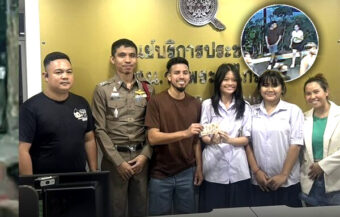Kingdom launches TouristDigiPay, a bold pilot letting foreign tourists convert digital assets into Thai baht in strict sandbox mode, with monthly limits, while officials say success could later unlock big purchases like luxury real estate and yachts nationwide.
The government on Monday launched a bold pilot allowing foreign tourists convert digital assets into Thai baht for spending across the kingdom. The TouristDigiPay system will start in strict ‘sandbox’ mode, capping individual transactions and monthly limits. Yet, officials say success could unlock much bigger purchases, from luxury real estate to yachts. Finance Minister Pichai Chunhavajira framed it as a clear signal: Thailand is staking its claim in the digital asset and payment revolution.

Thailand has officially launched a groundbreaking pilot project that allows foreign tourists to convert digital assets into Thai baht. The “TouristDigiPay” system was unveiled on August 18, 2025, by Deputy Prime Minister and Finance Minister Pichai Chunhavajira. This initiative aims to integrate digital currency use into everyday tourism spending. Furthermore, it represents a strategic move to link Thailand’s tourism sector with the global shift toward financial technology.
Unlike typical cryptocurrency systems abroad, TouristDigiPay does not permit direct spending of digital assets. Instead, it allows users to convert their holdings into Thai baht. Consequently, merchants receive local currency, not cryptocurrency.
Therefore, small businesses, street vendors, and convenience stores can participate without altering their existing payment systems. Minister Pichai emphasised this point at the launch event, noting that the system simplifies payments while benefiting small-scale merchants who often cannot handle credit card payments.
Thailand unveils TouristDigiPay pilot with limits to boost spending while helping small businesses and tourists
The sandbox program is carefully designed. For instance, it imposes a monthly limit of ฿500,000 ($15,400) and caps individual transactions at ฿100,000 ($3,080). Moreover, users must follow strict Know Your Customer (KYC) and Customer Due Diligence (CDD) procedures, supervised by the Anti-Money Laundering Office (AMLO). Consequently, the system maintains regulatory oversight while ensuring tourists can transact securely.
The pilot program runs for 18 months. During this period, authorities will assess its effectiveness, monitor usage patterns, and address potential risks. Additionally, Finance Ministry Permanent Secretary Lavaron Sangsnit explained that transaction limits could expand after the trial. This expansion might allow tourists to purchase high-value items, such as luxury real estate or yachts, while remaining fully compliant with Thai law.
TouristDigiPay is also designed to increase tourism revenue. Thailand welcomes approximately 35 million visitors annually. If the system encourages each tourist to spend an additional ฿5,000 ($154), total economic activity could rise by roughly ฿175 billion ($5.39 billion).
Minister Pichai highlighted this potential, explaining that merging tourism with digital finance creates new economic opportunities. Consequently, the project could enhance Thailand’s global competitiveness in fintech and tourism simultaneously.
Multiple agencies regulate TouristDigiPay to ensure safe digital asset transactions and merchant participation
The implementation framework involves multiple agencies. The Securities and Exchange Commission (SEC) supervises digital asset platforms, while the Bank of Thailand regulates the electronic payment system. Furthermore, the Ministry of Tourism and Sports promotes merchant participation. This collaborative approach ensures that both financial and operational aspects of the project are tightly controlled.
In practical terms, the system works as follows. Foreign tourists arriving in Thailand can open accounts with SEC-regulated digital asset operators. Then, they convert cryptocurrencies or other digital assets into Thai baht.
Afterwards, users transfer the baht into a “Tourist Wallet,” linked to an e-Money service provider. Finally, they can make payments at any participating merchant using QR codes or other electronic payment methods.
Moreover, the system allows users to convert unused baht back into digital assets. However, the conversion is limited to the original amount of digital assets deposited. Transaction fees are determined by participating digital asset operators within the sandbox framework. Therefore, tourists retain flexibility while remaining under strict regulatory oversight.
TouristDigiPay expands nationwide access while keeping anti-fraud measures and small vendor support strong
The project builds on Thailand’s prior experience with the Phuket Sandbox. That program allowed digital asset conversions within a limited geographic area. In contrast, TouristDigiPay expands access nationwide, giving tourists the ability to use digital assets across the country. Additionally, the new system includes rigorous anti-fraud measures, such as enhanced verification steps during both conversion and redemption processes.
Small businesses are central to the program. Unlike overseas crypto systems that mainly benefit large retailers, TouristDigiPay targets street vendors, cafes and convenience stores. Merchants simply need an e-Money system to accept payments. Consequently, even vendors in remote areas can participate, ensuring economic benefits are widely distributed.
The regulatory and security framework is stringent. The AMLO oversees KYC and CDD compliance, while the SEC ensures proper operation of digital asset trading platforms. Moreover, transaction limits vary according to merchant verification. Small, unverified merchants face a monthly cap of ฿50,000 ($1,540), while KYC-verified merchants can handle up to ฿500,000 ($15,400). Therefore, the system balances accessibility with risk mitigation.
TouristDigiPay pilot designed for scalability to expand limits and support high-value transactions after trial
TouristDigiPay is also designed with scalability in mind. After the 18-month pilot, authorities will evaluate user feedback, merchant participation and overall system performance. If successful, the program could expand limits, integrate new digital asset types, and possibly allow high-value transactions. Consequently, Thailand could become a global leader in tourist-focused digital asset payments.
Additionally, the program encourages broader digital adoption among tourists. As modern travellers increasingly rely on mobile technology and electronic payments, TouristDigiPay provides a seamless bridge between international digital assets and local currency usage. Therefore, it positions Thailand as a forward-looking destination for both leisure and financial innovation.
Economic experts predict multiple benefits. First, increased convenience may boost spending by short-term tourists who cannot open bank accounts. Second, small merchants gain access to a wider customer base, stimulating local economies. Third, the program encourages responsible digital asset usage, creating a safer financial environment. Consequently, the initiative strengthens both tourism and fintech ecosystems simultaneously.
Launch event underscores regulatory oversight and strategic goals for seamless digital asset payments
The launch event highlighted several strategic goals. Minister Pichai stressed that TouristDigiPay complements existing tourism infrastructure. Moreover, Permanent Secretary Lavaron Sangsnit noted that the project enhances Thailand’s financial competitiveness. Finally, representatives from the SEC and AMLO confirmed that regulatory oversight will prevent misuse, fraud and money laundering. Collectively, these measures ensure tourists, merchants and authorities all benefit.
Transitioning to operational details, the program requires tourists to follow four steps. First, open an account with a digital asset operator. Second, convert digital assets to Thai baht. Third, deposit the baht into a Tourist Wallet. Finally, pay merchants using electronic payment platforms. Throughout, regulatory safeguards ensure proper identification, monitoring, and transaction recording.
Furthermore, transaction fees are transparent and predefined. Digital asset operators participating in the sandbox set the fees, which are disclosed to users in advance. This transparency reduces confusion and builds trust among tourists, merchants and regulators. Consequently, the system encourages adoption without creating hidden risks.
TouristDigiPay to attract fintech investment while providing a safe, controlled platform for digital asset use
TouristDigiPay also aims to attract long-term investment in Thailand’s fintech sector. By demonstrating that digital asset conversions can coexist with robust local currency systems, the project signals Thailand’s readiness for future innovation. Additionally, it provides a testing ground for integrating digital currencies into real-world economic activities. As a result, the initiative may inspire similar programs in other countries.
Public response is expected to shape future developments. The SEC has already conducted pre-consultation sessions with potential operators. Feedback from these sessions informed transaction limits, merchant participation and system design. Moreover, tourists themselves may influence improvements through user experience surveys. Consequently, the program adapts dynamically to practical needs.
TouristDigiPay is also carefully designed to prevent direct cryptocurrency payments. This approach addresses concerns previously expressed by the Bank of Thailand. By ensuring that all transactions convert to baht first, the program avoids destabilising local currency markets. Furthermore, it creates a safe, controlled environment for both merchants and tourists.
TouristDigiPay aligns with Thailand’s economic strategy to strengthen tourism and fintech responsibly
Overall, the project aligns with Thailand’s broader economic strategy. Tourism is a major driver of national income, employment and regional economic distribution. By linking tourism with fintech innovation, TouristDigiPay strengthens these benefits. Moreover, it ensures that digital asset adoption occurs responsibly, under regulatory supervision and with practical economic advantages.
Tourism cryptocurrency sandbox payment plan is bound to face stiff opposition from the central bank
Tourism chief again plans to open up Thailand’s rock bottom tourism industry to cryptocurrencies
Undoubtedly, TouristDigiPay represents a major step forward for Thailand. It provides a secure, convenient system for tourists to convert digital assets into usable local currency. Additionally, it benefits small businesses, enhances regulatory oversight, and strengthens economic activity.
If the pilot succeeds, Thailand may set a global example for integrating digital currencies into tourism. Furthermore, it positions the country as a forward-thinking, innovative destination ready to embrace both digital finance and modern travel trends.
Join the Thai News forum, follow Thai Examiner on Facebook here
Receive all our stories as they come out on Telegram here
Follow Thai Examiner here
Further reading:
Tourism cryptocurrency sandbox payment plan is bound to face stiff opposition from the central bank
Thaksin calls for crypto-based bonds. Notes success and beauty of Isan women who marry foreigners
Future Bank of Thailand Chairman Pick warns that the Thai economy faces ‘disaster’ without rate cuts
Trump’s trifecta triumph means Thailand will be more on edge as he prepares to take power in January
Paetongtarn’s government set to tackle the evil of chronic debt in Thailand as the tide still rises


















